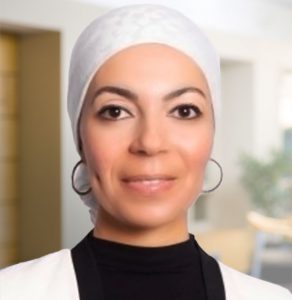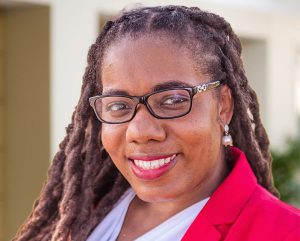Among Mitchell Hamline’s six newest faculty members are three women of color who are the school’s initial Visiting Assistant Professors (VAPs): Engy Abdelkader, Maikieta Brantley, and DeShayla Strachan.
The VAP program is designed specifically to diversify the legal profession by recruiting accomplished attorneys of color into teaching positions with two-year appointments -and an option for a third year.
The goal is to launch them into permanent teaching positions in the legal academy.
“There’s a gap between diversity within law school and the legal profession,” said Anthony Niedwiecki, who came to the job of Mitchell Hamline’s president and dean last year with the goal of starting such an effort. “Our student bodies are more racially diverse, but the legal profession on the whole is no more diverse than a decade ago.”
For example, 2020 data from the American Bar Association found five percent of all lawyers in the U.S. are African American, an unchanged percentage from 10 years ago. The entire country’s population is 13% African American.
Overall, people of color make up roughly 14 percent of attorneys in the U.S. but represent about 40 percent of the total U.S. population. Students of color currently represent 22 percent of Mitchell Hamline’s student population.
“Law schools have a duty to help close that gap, and more diversity among instructors is one step,” added Niedwiecki.

Engy Abdelkader
Engy Abdelkader is an accomplished human rights attorney who has been a fellow at the Public Religion Research Institute and German Marshall Fund of the United States. Abdelkader (she/her) also has taught at Rutgers University and Rutgers Law.
“At Mitchell Hamline, I hope to build upon my teaching experiences and prior research projects centered on religion, race, and gender at the intersection of law, politics, and society domestically and internationally,” she noted. “As a law professor, I want to help students achieve their goals by inculcating the skills necessary for their success irrespective of the career track selected.”
Abdelkader has a J.D. from Rutgers University School of Law and a Master of Law from the University of Pennsylvania Law School, and she chairs the Rights of Immigrants Committee with the American Bar Association Section of Civil Rights and Social Justice.

Maikieta Brantley
Maikieta Brantley joins Mitchell Hamline from the University of Denver Sturm College of Law, where she was a fellow in the Lawyering Process Program. She previously was in private practice in Missouri and Illinois, also serving as a mentor and mock trial coach.
A native St. Louisan, Brantley (she/her) taught at the University of Missouri after earning her master’s degree in accountancy and while attending the university’s law school. Her pro bono work has included representing clients in landlord/tenant matters; she also focuses on labor and employment issues.
“I’m most looking forward to teaching in the blended-learning program [at Mitchell Hamline],” she said. “I love the integration of learning and technology and that students can be from all over the world. I want my students to be prepared for the ‘real world.’”

DeShayla Strachan
DeShayla Strachan (she/her) was encouraged to attend law school by an attorney she met while working as a journalist in Florida.
She has served in attorney positions at the Florida Council Against Sexual Violence, the Florida Department of Children and Families, and as an assistant state attorney in Orlando. She also recently was an adjunct instructor at Mercer University’s law school.
Strachan has a B.S. degree from the University of North Florida and her J.D. from Barry University School of Law.
“Mitchell Hamline was first on my list [of places to apply] because it gives nontraditional students a chance to get a legal education,” she said. “I hope to encourage students to turn theory into practice-ready work.
“Then, go out into the world and be zealous advocates for those who cannot speak for themselves.”
Each visiting assistant professor will teach legal writing and one additional class while working on scholarship and serving the school and community. Future cohorts of VAPs are likely to teach different courses, depending on the needs of Mitchell Hamline at the time.
“We’re thrilled to launch this effort in our department,” said Tom Cobb, director of the school’s Legal Writing program. “Our first group of VAPs have deep practice experience and broad interest in skills teaching and will help us build a first-rate legal writing program.”
